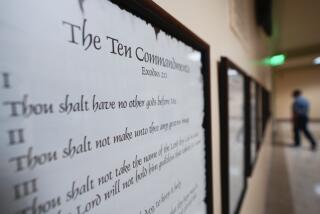Banning of Signs Faces Court Test : Proponents argue that a St. Louis suburb’s ordinance would fight ‘visual blight.’ Others see limits on free speech.
WASHINGTON — Three years ago, as U.S. troops geared up to attack the Iraqi army, Margaret Gilleo of Ladue, Mo., wanted to voice dissent. She put up a 2-by-3-foot sign in her front yard. It read: “Say No to War in the Persian Gulf. Call Congress Now.”
But her town, an affluent suburb of St. Louis, had recently enacted a ban on the display of nearly all signs and billboards. The purpose was to preserve “the charm and visual quality . . . of this heavily wooded, rustic” community, a city official said.
Gilleo dissented from that view too and won a federal court ruling declaring the city law an unconstitutional restriction on her free-speech rights.
Now her case, Ladue vs. Gilleo, 92-1856, has forced the Supreme Court to confront a question that has divided the justices at least since 1981. Does the First Amendment prohibit cities or other governments from banning most signs and billboards?
In the past, the court has permitted cities and states to restrict the placement of signs to certain locations, such as major roads or industrial zones. But so far the justices have refused to uphold a virtual ban on advertisements and political signs.
“This is a quality-of-life case,” said Diane Krejsa, a Maryland state attorney who filed a brief representing seven states in support of the city of Ladue. She urged the court to give government officials more authority to combat “visual blight” by restricting signs to those that provide safety or other basic information.
The Ladue ordinance, for example, permits little more than road signs, business identifications, religious symbols on church property and “for sale” signs in front of homes.
But the American Civil Liberties Union, which represents Gilleo, says that the law, in effect, unconstitutionally blocks an entire category of free speech: political messages.
BACKGROUND: The justices in 1981 struck down part of a San Diego law that prohibited outdoor ads except those at a business address. But the justices could not agree on a clear rationale.
Liberal members of the court, who joined with moderates in rejecting the law, said any such restriction on free speech was unconstitutional. The moderates agreed that the law was flawed because it banned signs with a political message but not others that advertised products.
In dissent, the conservatives, led by William H. Rehnquist, said that they would support even a complete ban on signs.
“In my view, the aesthetic justification alone is sufficient to sustain a total prohibition of billboards, regardless of whether it is a historic community such as Williamsburg (Va.) or one as unsightly as the older parts of many of our major metropolitan areas,” Rehnquist wrote.
Last year, the U.S. Court of Appeals in St. Louis invoked the 1981 ruling in Metromedia vs. San Diego to strike down the city ordinance in Ladue. “Ladue has singled out certain categories of signs for discriminatory treatment,” the lower court said.
But with Rehnquist now the chief justice, the high court announced it would hear the city’s appeal.
NEXT STEP: Oral arguments will be heard Wednesday.
The case gives the court a chance to clarify the law and possibly give government officials far more power to control “sign clutter,” as their attorneys put it.
Over the last two decades, the court has said repeatedly that officials may regulate free speech but may not forbid it. For example, police are permitted to restrict pickets to sidewalks and ensure they do not block an entrance to a building. They cannot ban picketing in an entire city, however.
Ladue city officials want to go one large step further and prohibit all signs, except those that are minimally necessary. If they win, it could amount to a major change in First Amendment law.
White House lawyers have entered the case in support of Gilleo. A “complete ban on a protected medium of expression” is unconstitutional, they say, because it discriminates against individual dissenters.
“Signs like the one at issue in this case are often the only way an individual can make a public statement,” the Justice Department argues. A ruling in the case can be expected by July.
More to Read
Get the L.A. Times Politics newsletter
Deeply reported insights into legislation, politics and policy from Sacramento, Washington and beyond. In your inbox three times per week.
You may occasionally receive promotional content from the Los Angeles Times.











